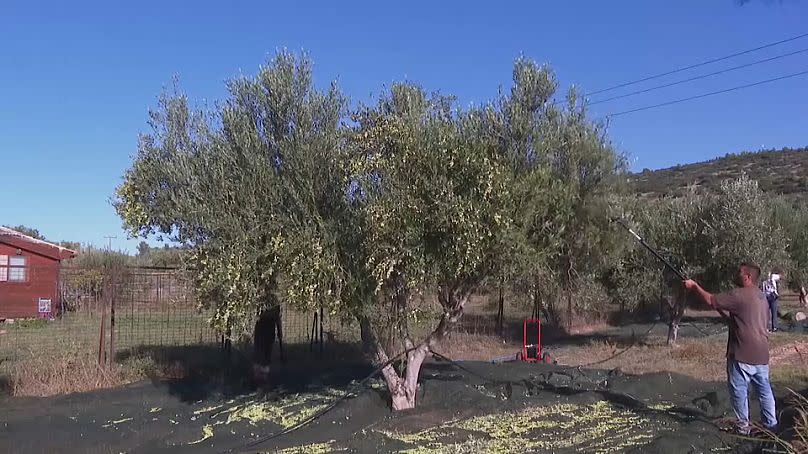Grove robbers target 'liquid gold' as olive oil prices triple globally
A global surge in olive oil prices – which have tripled since 2019 to set records – has presented criminals across the Mediterranean with an opportunity.
Warehouse break-ins, accounting scams and oil tampering are on the rise in the olive growing heartlands of Greece, Spain and Italy. And with growing frequency, gangs use chainsaws to hack off branches and cut down entire trees at unguarded groves.
The crimes are compounding distress among growers already battling high production costs and the impact of climate change: warm winters, major floods, and more intense forest fires.

The olive groves outside Athens are part of an unbroken tradition that stretches back to antiquity, on plains that now surround the city’s international airport. Some trees are centuries old.
Neilos Papachristou runs an olive mill and nearby grove in a fourth-generation family business. He says the chainsaw robbers are driving growers to harvest early and settle for lower yields to try and avoid long-term damage.
“The (robbers) look for heavily loaded branches and they cut them. So, not only do they steal our olives, but they cause the tree serious harm. It takes 4-5 years for it to return to normal,” Papachristou said, standing in a field at dawn.
Behind him, workers use large electric combs to scatter olives from the trees onto gathering nets. At his mill, farmers dump their crop into stainless steel loading bins, untying sacks or tipping over tall wicker baskets from the back of their pickup trucks.
Christos Bekas, who owns 5,000 olive trees, was among them. After repeated raids by thieves, he decided to cannibalise his crop with an early harvest.
“Last year, 3.7 kilos of olives would produce a kilo of oil. Now that it’s close to 10 kilos of olives for a kilo of oil, for my 600 kilos of olives I will get 60 kilos of oil. Last year I got 180,” Bekas said.
After decades of growth, the global olive oil market has been disrupted by a near two-year drought in southern Spain, a country that typically covers 40% of the world's supply.
According to European Union estimates, the Spanish slump will help push global production down to 2.5 million metric tons in the 2022-23 crop year, from 3.4 million in the previous annual cycle.
Rising temperatures are affecting flowering, farmers and experts warn, while higher fertiliser prices and labour shortages are also hitting costs.
With global demand remaining high, international importers are often willing to offer prices above domestic rates. Year-on-year exports from Greece more than doubled in the first five months of 2023, while Turkey in August suspended exports to protect its domestic market.
Benchmark prices in Spain, Greece and Italy are monitored for the highest grade of olive oil, known as extra virgin, by the International Olive Council, an intergovernmental organisation based in Madrid.
In late 2019, wholesale prices dropped below 3 euros per kilogram. By last September, they had reached 9 euros per kilo.
Spanish police last month said they had retrieved 91 tons of stolen olives in recent weeks. In February, six people were arrested in southern Greece for the theft of eight tons of olive oil in a series of warehouse break-ins reported over several weeks.
Farmers based around the southwestern Italian port city of Bari, say robbers in the area have become increasingly brazen, snatching tractors and expensive equipment along with olives.
The regional agricultural association issued a plea for police assistance following reports that 100 olive trees were destroyed or seriously damaged in a single incident last month.

